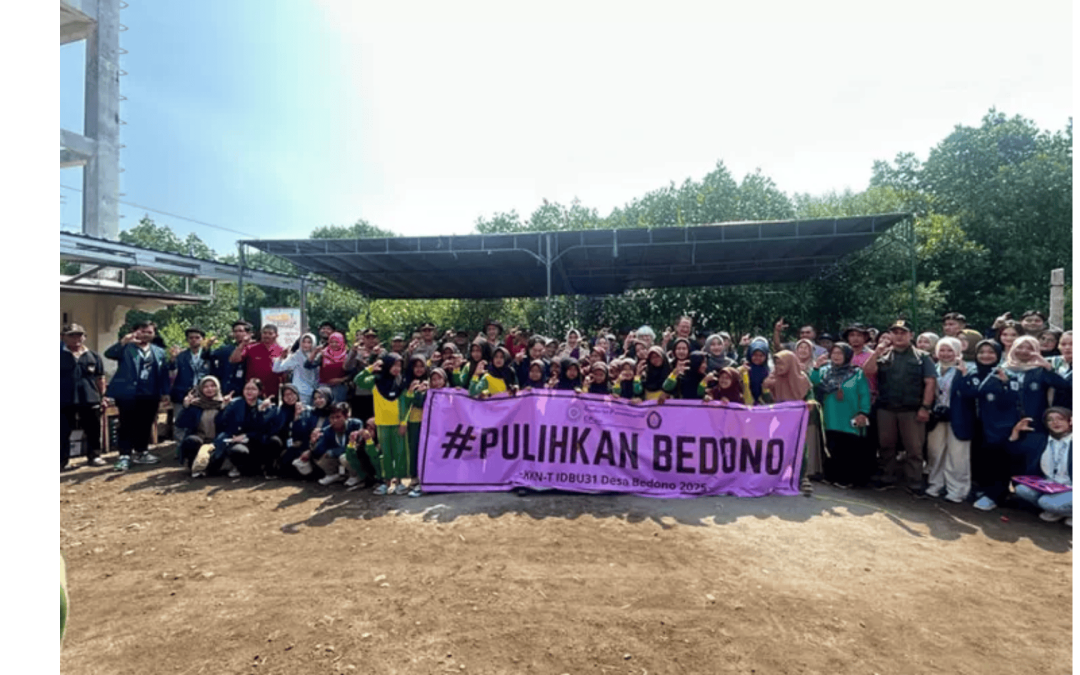The Faculty of Science and Mathematics (FSM) of Diponegoro University once again demonstrates its commitment to strengthening science through real-world action by implementing an international collaborative program in Bedono Village, Sayung, Demak Regency. The culmination of this program took place on Saturday, July 19, 2025, marking a significant milestone in the transformation of Bedono Village into an international-scale living laboratory.
Previously known as one of the most severely impacted areas by coastal abrasion and tidal flooding in northern Java, Bedono Village is now evolving into a living lab through a strategic initiative led by FSM UNDIP via the Cluster for Paleolimnology (CPalim). This initiative is part of a series of International Community Service activities supported by the World Class University (WCU) SDGs Program of the Faculty of Science and Mathematics UNDIP. In this program, FSM UNDIP collaborates with international partners from the Netherlands, namely CoPSEL (Communication, Participation & Social Ecological Learning) of Van Hall Larenstein University of Applied Sciences and the Knowledge, Technology, and Innovation (KTI) Group of Wageningen University & Research.
“The Bedono Living Lab is not only a cross-actor learning space, but also concrete proof that science can address real challenges faced by society,” said Prof. Dr. Tri Retnaningsih Soeprobowati, M.App.Sc., Professor at FSM UNDIP and Director of CPalim. Through a Nature-Based Solutions (NbS) approach, the program integrates scientific knowledge with local wisdom to deliver ecosystem-based solutions that enhance the socio-ecological resilience of coastal communities. Key achievements of the program include:
- Planting over 2,000 mangrove seedlings in abrasion-affected areas;
- Developing the educational tourism route “Mangrove Tunnel of Mina Bedono”;
- Assisting KKNT31 FSM UNDIP students in designing educational signage and eco-tourism infrastructure;
- Empowering local women-led SMEs through digital marketing training and seafood product packaging, with support from Bank Indonesia.
The program reached a key milestone on July 19, 2025, marked by the transition from KKNT31 student Batch 1 to Batch 2—ensuring continuity within this ongoing learning cycle. This process reflects how FSM UNDIP students are not just academic participants, but also agents of change within the community.
The presence of two Dutch scholars, Prof. Loes Witteveen and Dr. Rico Lie, further strengthened the international dimension of this program. Prof. Loes stated that Bedono is not merely a disaster-impacted site, but a shared learning space where scientific and local knowledge complement each other. She emphasized that the active involvement of students, residents, and local stakeholders creates a strong foundation for social and ecological transformation.
Meanwhile, Dr. Rico Lie highlighted that the strength of the Living Lab lies in real community engagement. For him, the Bedono experience serves as a concrete model of how knowledge can be directly connected to community action.
The Bedono Living Lab stands as a collaborative model that is highly relevant for replication in other coastal areas across Indonesia. FSM UNDIP reaffirms that synergy among universities, communities, and global partners is key to creating a resilient and sustainable future.
This event has been covered by the media and can be read in full through the following link:

